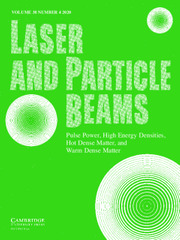Article contents
Temporal measurements of extreme ultraviolet (EUV) emission, from low temperature, EUV-induced plasmas
Published online by Cambridge University Press: 31 August 2018
Abstract
In this work, extreme ultraviolet (EUV) emission, from EUV induced, low-temperature microplasmas, were investigated. To perform temporal measurements of the EUV pulses of low intensity, in a medium vacuum, under the pressure of the order of 0.1–0.01 mbar a special detection system was prepared. The system was based on an EUV collector and a semiconductor detector, sensitive for the EUV photons. The collector consisted of two identical grazing incidence, paraboloidal mirrors, and allowed to focus a part of the radiation emitted from the microplasma onto the detector surface. An absorption filter, mounted between the collector and the detector, allowed for selection of an interesting wavelength range. Plasmas were created by irradiation of small portions of gases, injected into the vacuum chamber, using a laser produced plasma EUV source. Three gases were used for the EUV induced plasma formation: neon, krypton, and xenon. Low-temperature plasmas, created in these gases, contained multiply charged ions, emitting radiation in similar wavelength ranges. Two detectors, AXUV20HS1 and AXUVHS5, were used for the measurements. It was shown that differences between the corresponding signal profiles, obtained using both detectors, were not very significant. Moreover, it was demonstrated that the duration of the EUV emission from plasmas, created in different gases, were comparable with the duration of the driving EUV pulse. The longest EUV emission was observed for Kr plasmas, approximately 1.5 times the full width half maximum of the driving EUV pulse.
Information
- Type
- Research Article
- Information
- Copyright
- Copyright © Cambridge University Press 2018
References
- 9
- Cited by

